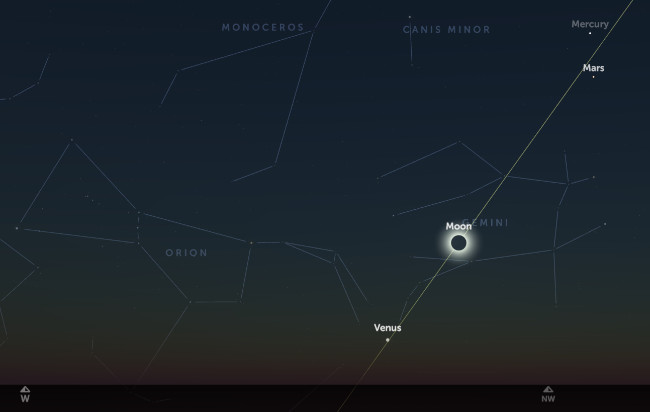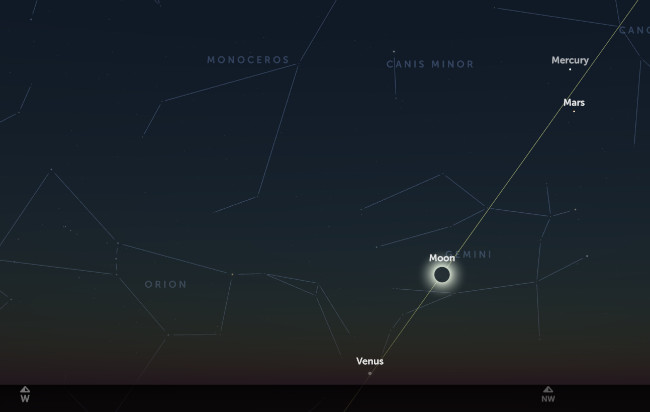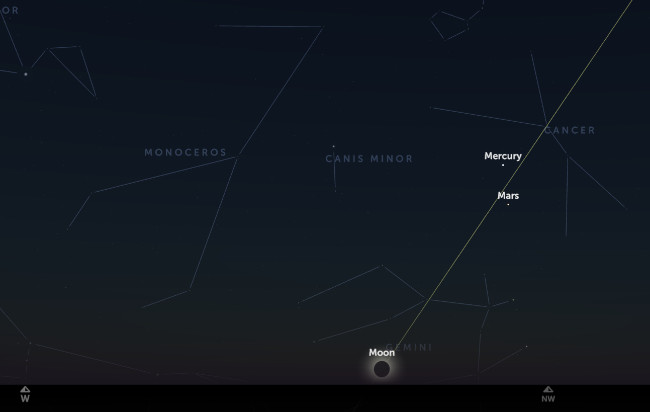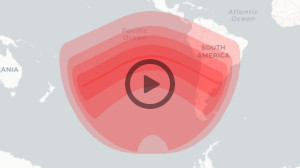Total Solar Eclipse over Argentina
Total Solar Eclipse of July 2, 2019 visiblility from Argentina
TOTAL Solar Eclipse over EUROPE - August 12, 2026. See Totality Path
Is the July 2, 2019 Total Solar Eclipse visible in Argentina?
July's Solar Eclipse 2019 will be visible in Argentina as a total and partial eclipse depending on the location you are on..
Totality will be visible in the provinces Buenos Aires, Cordoba, La Rioja, San Juan, San Luis, Santa Fe. Cities in the totality path
include
Rio Cuarto,
San Juan,
Villa Dolores,
Dolores,
Lujan,
Merlo
The rest of the country will get partial eclipse of the sun but even on the southernmost parts of the continental Argentina (e.g. Rio Gallegos) about 50% of the Sun
will be covered. North of the Argentina (e.g. San Salvador de Jujuy) will experience about 75% of obscuration. The capital city of Argentina - Buenos Aires will
witness almost total eclipse - 99% of the Sun will be covered by the Moon.
Where are the best spots to see Total Solar Eclipse in Argentina?
What time is the Eclipse in Argentina?
See more information about this eclipse in Argentina on the map or in the city table below or navigate to the main page of this event Solar Eclipse of July 2, 2019 or See eclipse on the World Map
- More Resources:
- Watch the Eclipse of July 2, 2019 Online
- July's 2019 Total Solar Eclipse on the World Map
- Total Solar Eclipse in Chile (best spots, when and where to see, eclipse map of Chile)
- Total Solar Eclipse in Argentina (best spots, when and where to see, eclipse map of Argentina)
- List of towns and cities where the eclipse is visible
See Solar Eclipse of July 2, 2019 on the World Map

Sun disc obscuration - Percent of the Sun covered by the Moon at the maximum eclipse. Totality will occur in the area marked by the darkest red color.
Click on the Argentina map to get detailed information (time of phases, type of the eclipse, magnitude, obscuration, ...) about Solar Eclipse at any given geografical location or find location on the list of cities
Chile or Argentina? Which location is better for seeing total eclipse?
The maximum of the Total Eclipse over South America will take place just before sunset, hence the sun altitude will be low. In Chile maximum eclipse will be sooner than in Argentina, so the sun will be heigher in the sky. Images below show sun position and altitude during maximum eclipse seen from La Serena, Chile; San Juan, Argentina and Buenos Aires, Argentina. As you can see, in Buenos Aires the sun is very low, so you have to find a place where you will be able clearly see the west and west-north horizon with no obstruction like buildings, mountains or trees. The second reason Chile is better place to see the eclipse is that, in Chile the phase of the total eclipse is a little longer than in Argentina.

Sun altitude (13°) and position during maximum eclipse (July 2 at 16:39 CLT) seen from La Serena, Chile. See it or even animate it in StarAtlas.com - Eclipse La Serena, Chile

Sun altitude (10°) and position during maximum eclipse (July 2 at 17:41 ART) seen from outskirts of Sun Juan, Argentina (route 40, Albadron) See it or even animate it in StarAtlas.com - Eclipse San Juan, AR

Sun altitude (1°) and position during maximum eclipse (July 2 at 17:44 ART) seen from outskirts of Buenos Aires, Argentina See it or even animate it in StarAtlas.com - Eclipse Buenos Aires, AR
Total Solar Eclipse of July 2, 2019 - City List
The table below lists more then 90 cities and places around the world, where you can see July's Eclipse of the Sun. You can find out when the eclipse starts and ends, what is the obscuration of the Sun disc and what type of the eclipse occurs in any given location (T-total, P-partial eclipse)
Click on the city name (first column) to get more detailed information about solar eclipse in this place, e.g. sun azimuth and altitude, geografical coordinates and altitude etc. Use search box to select desired location(s): city or country. All times in the table are given in local time (see column Time Zone).
| City | TimeZone | Eclipse Type |
Partial Eclipse Begins |
Total Eclipse Begins |
Maximum Eclipse |
Total Eclipse Ends |
Partial Eclipse Ends |
Eclipse Magnitude |
Eclipse Coverage [%] |
Total Eclipse Duration |
|---|


